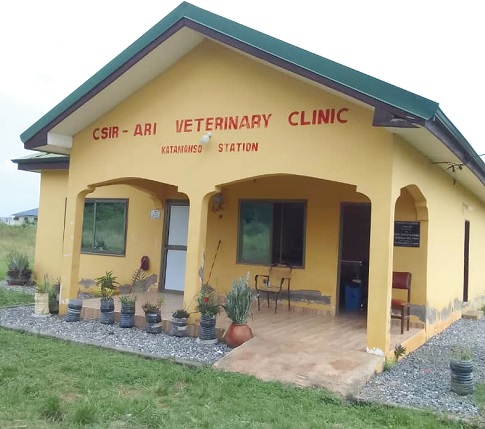
Zero human deaths from dog-mediated rabies by 2030 - Myth or reality
Rabies is a neglected tropical disease of significant public health importance, with a high case fatality rate of 99.9 per cent.
Advertisement
The viral infection affects both humans and warm-blooded animals, such as dogs and cats.
Though it is 100 per cent preventable using the currently existing vaccines, medicines and needed technology, rabies accounts for 59,000 preventable global human deaths.
Africa and Asia bear the highest burden, constituting approximately 95 per cent of these human deaths, with half of the affected victims below 15 years of age.
Of the reported cases, 99 per cent were contracted through dog bites, making it a serious health risk for the global transmission of the disease.
With an ever-increasing stray and feral dog population, Ghana is among the over 100 countries currently endemic for rabies.
It is not surprising that a substantial number of new cases of rabies, with an annual estimated death of approximately 112 persons, are reported yearly within the country.
Despite this number of human fatalities and brutalities meted out to affected dog victims, the country has low (0.80%) dog vaccination coverage with few human victims utilising the life-saving post-exposure prophylaxis (PEP) within 24 hours after exposure to the virus.
The government spends over $16,013,648 yearly on treating and managing rabies alone.
Disease of poverty
Rabies is a disease of poverty; in recounting a sad incidence of a child who died of rabies.
Case tracing revealed that the first health post (private clinic) of call did not have the PEP and parents of the child could not also afford the cost of vaccine and immunoglobulins from a community pharmacy.
The child victim was treated for injuries and received antibiotics without a complete PEP regimen.
After about five weeks of onset of non-specific symptoms, parent treated the child for malaria, followed by specific rabies symptom presentation after two days and later referred to a tertiary hospital where she died.
The situation in Ghana is alarming and worrying in a time when it is expensive to seek health care coupled with uncoordinated reporting structures to obtain consistent and quality surveillance data to inform public health decisions and policies.
This will, therefore, require urgent attention, interest and appropriate coordination from relevant stakeholders from human, animal and environmental health institutions if we want to eliminate the disease in the country by 2030 as stipulated in the sustainable development goals.
Eliminating the disease by targeting dog-mediated rabies is also everyone's business and a step in the right direction to save humans and dog companions from the devastating effects of rabies.
Tools
Interestingly, the management, control and preventive tools for rabies are available and up to 100 per cent effective at preventing human deaths and protecting dogs.
They include increasing awareness, vaccinating dogs to prevent the disease from its source, and providing life-saving treatments after being bitten.
In 2006, it was clear that with the existing momentum, laxity in campaigns, individual apathy with regard to responsible companion animal ownership, poor health-seeking behaviour and the uncoordinated effort from multi-stakeholders in human health, animal health and environmental health, among others, rabies cannot be eliminated in Ghana and at the global level hence the establishment of the 'World Rabies Day' (WRD) which is celebrated every 28th day of September.
This year marked the 17th Celebration of the WRD on the theme 'All for One, One Health for All', a remarkable initiative by the Global Alliance for Rabies Control (GARC).
Mooted in 2006 with support from the World Health Organisation (WHO), World Organisation for Animal Health (OIE), Food and Agriculture Organisation of the United Nations (FAO) and other regional bodies, our team from Council for Scientific and Industrial Research – Animal Research Institute (CSIR-ARI) also join hands with all such organisations and through research and stakeholder engagements to promote awareness, control and prevention of human and animal rabies.
As the world rallies its effort towards the global agenda of eliminating human rabies contracted from dog bites by 2030, there are bottlenecks observed that will require urgent interventions at regional, local and community levels.
Our team at CSIR-ARI has observed issues such as inconsistency in campaigns, vaccination and awareness programmes, lack of funds, and indifferent attitude of some pet owners towards their dogs in the past, which has contributed detrimentally to the global fight against rabies.
We agree with the One Health strategy to aid in eliminating the disease; more funding or research and support for rabies management will help strengthen human and veterinary health systems in the country.
The theme for this year re-echoes the fact that we need everyone on board to save ourselves and our pets.
Coordinating surveillance data among those in human health, animal health and environmental health institutions will be required.
Media outlets must effectively broadcast information on rabies in conjunction with appropriate stakeholders to increase awareness.
Commitments from members of Kennel-groups and individuals towards responsible ownership of dogs and avoidance of dog bites will be required to control the spread of rabies.
The metropolitan, municipal and district assemblies could also support enacting by-laws to reduce human contacts with stray dogs, which is rampant today in our communities. Rallying support from all sectors, groups and individual levels is essential to ensure that the rabies elimination exercise becomes a reality.
The writers are
Dr Jonas Bedford Danquah (email: [email protected])
Public health/ Biomedical Scientist (Research Scientist)
Dr Hilda Ohene Asa (email: [email protected])
Veterinary Surgeon (Principal Technologist)
Dr Jennifer Afua Afrifa Yamoah (email: [email protected])
Biochemist/Biomedical Scientist (Research Scientist)
Address:
Council for Scientific & Industrial Research
Animal Research Institute
Adenta – Frafraha,
P. O. Box AH 20
Accra – Ghana




